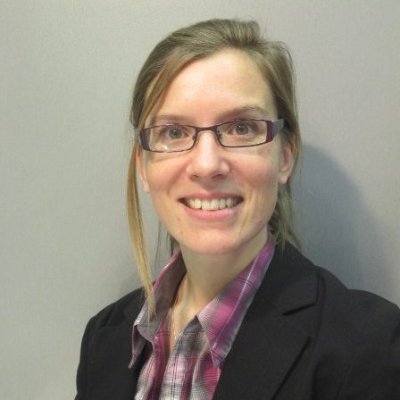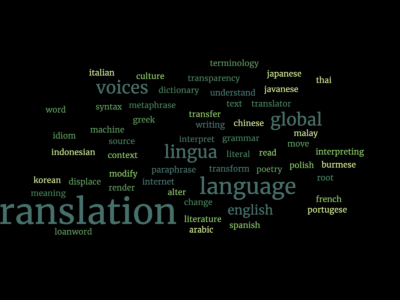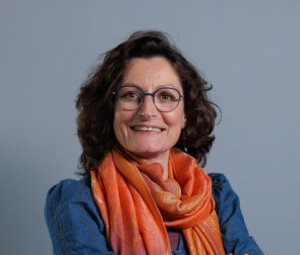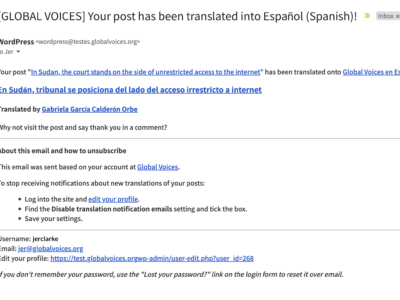
Gwenaëlle Lefeuvre, French Translation Manager.
Gwenaëlle Lefeuvre is our French Lingua Translation Manager. Gwen is a physicist, bookworm, and a Minority Language advocate. Gwen tells us more about herself in this interview!
Tell us a bit about yourself, how you joined Global Voices and the stages of your involvement within GV
I was looking for alternative career options for a friend, and I stumbled on a translation blog that mentioned GV. I had a look, volunteered as a translator, and here I am. I translate from English into French, but I try to read it in other languages too (not very successfully though). Last year our editors Claire and Suzanne offered to have me sub-edit the translations on our French site, and this year Eddie Avila finally convinced me to write about minority languages. I'm having a great time!
Did your experience of translating, authoring and editing change your vision of the world?
Definitely! I've always tried to keep up to date with what happens in the world, but having access to information that no one talked about was an eye-opener. Knowing what is going on in, say, Guatemala, Sri Lanka or Japan made a difference in the way I think of my place in the world as a citizen. The world became much bigger and much smaller at the same time, thanks to the news and to the members I've met (mostly virtually).
Does your work with GV impact your professional practice? Do you think your experience in GV is useful in other aspects?
GV doesn't have a direct impact on my career because my line of work has nothing to do with journalism or activism: I'm a physicist. I work with things and machines, which I understand very well. Working with GV helps me try to understand people, how similar we all are, but in different ways. As my company has customers all around the world and I am in touch with them, I am now more systematic about learning of our cultural differences and how to show respect and politeness. This has made a difference in the way they relate to me, which is very gratifying.
Translating and editing have helped in another way: I am a typical French in that I love my language. But I left France some ten years ago, and I was afraid to lose my mother tongue. Working with GV became the best way for me to keep my French as sharp and accurate as possible. It's difficult, but I love it.
Give me an example of your average day. Could you also elaborate somewhat on how you manage your own time for all these tasks, including your day job? Any tips?
Most days I have a routine, mostly because I have a 9-5 job. I like to get up early, but I also like to sleep, so every morning is a competition between these two opposites! If I manage to get up early, I write a little, and then I go to work. I walk along the sea front before catching the bus to work. It's my most luxurious and peaceful way to start my day.
My work day (in a semiconductor company) is divided between working in a clean room, alone or with my technicians, and at my computer on projects with customers and industrial partners. We are a small company trying to bring a fairly new technology to the mainstream market, so partnerships are very important, and are also one of the most interesting aspects of my work.
I often chat with my parents on Skype in the bus home and the rest of the evening is “free”: for GV, quality time with my husband who also works a lot, moving our stuff around our flat as we're still knee-deep in our renovation project…
Finding time for GV and hobbies is about focusing my attention on one task at a time and not feel guilty about all the other things I should, or could do and that I am not doing. Multitasking is a scam, after all. For GV, I decide whether I translate, edit or write on any given day, I find this more efficient as my brain doesn't have to pick up too many pieces.
What were your previous experiences translating? Was it very different from what you had done before?
I only translated a significant text once, for a friend working on a thesis. She had to read long handwritten letters from the early 20th century. While she could understand enough French to get the gist of them herself, she couldn't read the handwriting. The literary style was very challenging to translate, but I loved explaining the cultural nuances of the old French.
So what do you do when you're not translating?
Apart from working and moving furniture in my apartment, I love, well, too many things! Learning languages, dancing, walking in the countryside and town, reading, chatting with my family, keeping in touch with my friends all around the world, visiting them and traveling to new places, and now writing too. I will have a blog (on languages, of course!) within a month, so that is also keeping me busy.
Describe your work at Lingua and tell us about your plans and future hopes for the site? How is the French site of GV doing?
While I absolutely love translating and editing the posts for Lingua, my favorite part is the interaction with our team of translators. We have such great people on board: they are all so welcoming to newcomers, eager to help one another with any linguistic or technical issue. It's a real pleasure to be part of this team and to have an opportunity to see them grow as translators. After being given the same generosity when I started out in GV, it's both exciting and humbling to have a chance to give back.
The French site is doing great! Thanks to their dedication and dynamism. Now, as I said a few times, what I would really love is to see it become famous! I do believe that despite the new challenges that a wider recognition can bring, the quality of the news and our team of authors and translators deserve it. Now how to achieve this goal is a community effort, one I hope to be part of.
Why do you think a man in the street should read GV in French?
The man and the woman in the street should read GV in French for the variety, one they can rarely have access to in the mainstream media. For the empathy and the humanity of the articles, because we hear a lot about what the politicians’ squabbles but rarely about the lives of the rest of us. To remember that we all share the same tiny planet and that our problems are not so different.
How do you pick posts to translate into French, and, in fact, why did you choose to volunteer this way?
I started with selecting articles I found interesting for myself, so I could also dig in and learn more about another country. Little by little I realized that I was more drawn to articles relating to women's rights and minority languages, so now I tend to translate mostly, but not exclusively, these topics. I think it's very important that the French-speaking public know what women are up against all around the world, and also that they realise that minority languages can be an incredible asset to a population and don't have to be treated like a national liability (as they are in France when they're not just swept under the carpet).
In all the time you have been collaborating with GV, what is your most memorable experience?
Not one in particular, but all the communication with GVers, meeting them online or even better, in person. I was lucky to meet three members of the French Lingua team in Strasbourg last year, including our wonderful editor Suzanne, and with an Afghan author in Delhi earlier this year. Also, back in March, I received an overwhelming number of encouragement messages from the French Lingua team when I ran for the Board elections: I still feel so grateful for their trust, it actually feels as if I won! I cannot wait to meet more of you.
You've been translating for GV for over three years, what would you say to those just starting out?
Come on in, we're super nice people, and you won't be alone in your translation journey! And while the community makes it enjoyable and enriching, you will have the responsibility to pass on the author's message onto a different public, spread the news, so your work will be important!
Multilingualism is also at the heart of your concerns. Why is multilingualism important?
There are many ways to look at multilingualism, and mine is mostly about respect. I simply can't fathom how a country can pretend to respect its citizens when it discourages or suppresses the use of certain languages, deemed not worthy, not valuable, or not intellectual enough. I recently discovered that my own father's mother tongue was not even French but a regional language. In a sense, I feel robbed of a whole cultural heritage that I could have received but never knew about, all because of an unnecessarily restrictive language policy.
Viewed from another angle, multilingualism is not about more communication but better communication. Learning a language is not just learning words and sounds, it's learning about the culture, and about “talking to people's hearts” as Nelson Mandela put it.
So let me ask you about your own dreams. What are your dreams?
The world where borders are obsolete, and absolutely everybody speaks at least three languages, enough time in my days to learn at least 15 more, visit Japan, Argentina and much, much more of India? My dreams are rather daydreams, but they fuel my days with the energy I need to accomplish a little of all that!
What is the GV spirit?
That's a difficult one since the community is so diverse. The GV spirit is what everybody puts in and gets out of it and for me, it's about the inclusiveness and the kindness I have found in every single one of my interactions with any GV member.
Tell us about the city you live in.
I live in Brighton, on the south coast of England. It's a popular seaside resort where people come since the 18th century to party and have fun. It gives the city a relaxed atmosphere, and while it's not very big on museums, we have a lot of festivals all year round, about pretty much anything one can think of: early 20th century cars, food, music, a pagan celebration of winter… In many ways, it's a town that is bigger and more interesting than it looks on the map.
I really enjoy living here, between the sea and a lively town. It is a young city, with many colleges, language schools, and two universities. It is a very international place, but it almost has a French feeling about it, with lots of cafés and their terraces always full.
It is telling that it was one of the towns of the south of England that was the most opposed to Brexit. I guess the universities and the large LGBTQ population helps in making it one of the most inclusive, albeit expensive, cities in England. I really hope things won't change for the worst. I can still feel European here.
And how would you describe your country to a foreigner?
It is so difficult to describe France! Everyone read something about it, visited it or knows someone who has and has an opinion about one French thing or another.
Having lived abroad for more so long, I think now, that my country is a paradox. It wants to see itself as a cultural beacon but has troubles facing the shameful acts of its colonial past. It loves its language to the point of making laws to resist the English “cultural invasion”, but it acknowledges how repressive its policy is regarding its own regional languages. It tries to tackle issues of immigration and integration differently than other countries and is getting a lot of grief for that, but swimming against the current rarely bothers it.
France seems an easy target to clichés, but please stay away from them. Like any country, it is complex and evolving. Like any other place, you will find open- and closed-minded people. Visiting it once will give you an experience, not “the knowledge”. And visiting Paris is not visiting a region, as the local population will be keen to remind you!
Finally, describe yourself and how you see the world.
Physics has shaped the way I see the world, but as one of our classical authors once wrote, “Science sans conscience n'est que ruine de l'âme” (“Knowledge without conscience ruins the soul”, Rabelais, 1532). I still believe that scientific progress has the means to improve people's lives, so I guess that makes me an optimist!
Thank you Gwen for taking us for this trip into your life and GV experience! Don't forget to follow her on Twitter @DiffractedWord.




1 comment
Thanks for the beautiful read!